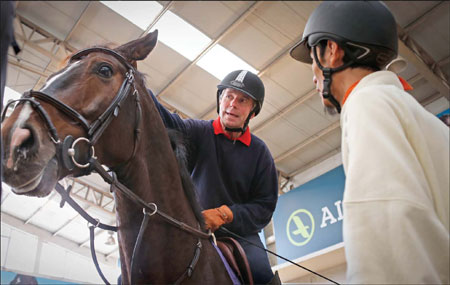Horse sense

| Jeremy Michaels gives a private training session to Liu Xiao, an equestrain lover from Beijing, and his horse. Kuang Linhua / China Daily |
Among the best-qualified equestrian trainers in Europe, Jeremy Michaels is on a mission to improve club standards across China
On a snowy windswept Friday night, horse enthusiasts crowd into a seminar room at an equestrian center in the northeastern suburbs of Beijing. The reason they have braved the weather? Jeremy Michaels, one of just 50 people across Europe to have gained a British Horse Society Fellowship, the highest teaching and riding qualification that the BHS can offer. "When I came here, people were so hungry for knowledge, which made me enjoy being with them very much," he says.
From Gloucester in England, Michaels gained the British Horse Society Fellowship in 1987. Since the early 1990s, he has worked for top equestrian education institutions, including Hartpury College in Gloucestershire and the BHS, where they train the best riders and administer an examination system for trainers and riders in the UK.
In China, he was teaching more basic skills, such as how to mount a horse properly, how to get off and how to hold the reins.
With his high level of equestrian qualifications Michaels may seem overqualified to teach beginner lessons in riding, but he believes basic education is essential for the rapidly growing equestrian sports scene in China.
His association with China began in 2003 when he worked for Hartpury College as director of its equine department. The Chinese Equestrian Association contacted the college seeking help to develop systems to govern riding qualifications, horse welfare and riding centers.
Hartpury recommended Michaels as the man to help, based on his previous experience as deputy chief executive of the British Horse Society. Since then, he has traveled to China two or three times a year to teach in Beijing and Shanghai, for around two weeks at a time.
In order to develop an equestrian system suitable for China, Michaels visited numerous riding schools across the country.
The development of a Chinese riding examination system was eventually suspended by the association, but Michaels' visits have continued and won him many fans among the Chinese riding fraternity.
"It's really good for me because I can walk around and advise people," he says.
Compared to a decade ago, the facilities in Chinese equestrian clubs today are vastly improved. Bur there is still work to be done, Michaels says.
Five years ago he witnessed rats in the feeding room, nails sticking out of walls and dangerous electric wires at one club.
"It's not like those people hate horses or want to abuse them," he says. "It's purely that they don't know better. Basic knowledge is so important but there is a big shortage of it in China."
Those negative experiences have driven him to concentrate on the basics in China.
"Training people is like training the horses," he says. "For a young horse, it should start with basic rides. After months and years of basic training, it can start jumping the bigger fences, and then the horse is confident and relaxed, so it will be happy to jump and not feel threatened or worried."
The passion for horses Michaels has seen in China has impressed him.
"There is a Chinese lady, who is very sweet. I don't know her profession. She is so keen to learn. Everything I say, she tries and tries so hard. She improved dramatically after a few sessions," he says.
The schedule for Michaels' China trips is always tight. During his visit to the Equuleus International Equestrian Center in Beijing in November, he gave lectures from 8 am to 6 pm, each costing 600 yuan ($96; 74 euros) an hour per person. Places were quickly sold out. During his lunch break he continued to work, arranging details with the club's management as he ate.
"I feel busy all the time when I am in Beijing, but it's enjoyable," he says.
Liu Xiao, a Chinese horse enthusiast from the club, managed to get hold of a ticket to one of Michaels' lectures after another club member couldn't make it.
"I have heard about Jeremy for a long time," he says. "I hope he can take a look at the horse I bought in Europe and give some suggestions on my riding. His sessions were quickly booked up once people knew he was coming. I am so happy to finally meet him in person," he says.
With just a few sounds from Michaels' mouth, Liu's 7-year-old horse Warmblood began to follow the British trainer's commands. He rode the horse around the arena a few times and then pulled him up and suggested a veterinary check up because the horse seemed unable to run straight.
"The way that horse is walking is not normal," he says. "I need to be sure that the horse is not suffering any pain or physical problems, before we carry on with further training."
He refused to take a training fee from Liu and helped him find a veterinary physician before moving on to the next appointment.
"Jeremy is right," says Liu. "I can train with my horse later. But if it has some physical problems, I need to treat it first. He is the type of coach who doesn't just care about skill but also cares about the horses in general."
zhaoyanrong@chinadaily.com.cn
(China Daily 12/14/2012 page29)
Today's Top News
- Xi stresses improving long-term mechanisms for cyberspace governance
- Experts share ideas on advancing human rights
- Japan PM's remarks on Taiwan send severely wrong signal
- Key steps to boost RMB's intl standing highlighted
- Sustained fight against corruption urged
- Xi calls for promotion of spirit of volunteerism































